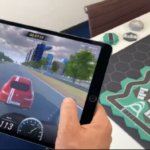Nreal began selling its new augmented reality (AR) glasses, the Nreal Light, in South Korea during the summer, expanding into Japan during October. Both were via partnerships with telecommunication companies, LG U+ and KDDI respectively. The same goes for Europe, with Vodafone announcing a rollout will begin next Spring.

Available to both consumer and businesses alike, Vodafone will initially launch the Nreal Light in Germany and Spain followed by more markets during the course of 2021. As the AR glasses require a smartphone connection, the device will be sold alongside Vodafone’s Gigabit 5G network.
“European consumers will be able to experience the future through Nreal Light. They’ll enjoy a new way to see and interact with their favourite apps in a 3D mixed reality environment on Vodafone’s 5G network. We’re excited to be making Nreal Light available in Germany, Spain and other European countries in partnership with Vodafone as we continue our mission to make Mixed Reality accessible to consumers around the world,” said Nreal CEO Chi Xu in a statement.
Using a USB-C connection, the Nreal Light is compatible with modern Android phones, offering a lightweight mixed reality (MR) solution over larger enterprise-focused devices like Microsoft HoloLens 2. Nreal Light will still include features such as 6 degrees-of-freedom (6DoF) tracking, plane detection and image tracking.

The glasses have a 52° field of view (FoV) and should be ‘compatible with most existing Android smartphone applications’ claims Nreal. Therefore you should be able to easily watch videos, jump on social media or shop online, all in AR.
Vodafone has yet to reveal the pricing plan for Nreal Light in Europe but in Korea the glasses retail for 699,000 KRW (about £480 GBP/€530 EUR), so expect something in that region. For developers, there’s the Nreal Light Dev Kit which retails for $1,199 USD.
Nreal and Vodafone’s partnership doesn’t end there. Both are working on immersive AR and MR applications for consumers and businesses such as sports apps that overlay stats and multiplayer games for the former and remote collaboration, product training and remote technical support for the latter.
Quelle:


